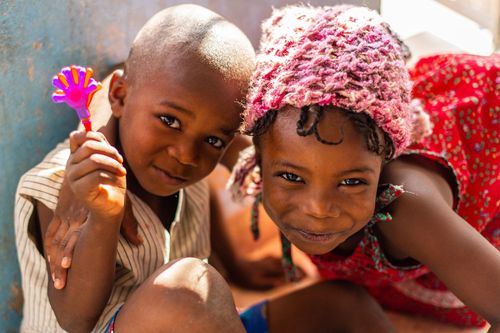Show Notes
World Orphans Day is Nov. 14. Most people think of adoption as the only way to care for orphans but, in reality, the solutions to this crisis are just as numerous as its complexities.
In this episode of On the Ground with Samaritan’s Purse, host Kristy Graham speaks with experts in the field as they unpack the complexities of the global orphan crisis.
First, Kristy sits down with Dr. Rick Morton, vice president of engagement with Lifeline Children Services. Dr. Morton shares his own family’s adoption story and the Gospel conviction that he and his wife felt as they welcomed their three children home.
“Part of answering the call to adoption is to step into brokenness. We know that we are in the circumstances that we’re in as a family because some things didn’t go right. But that doesn’t mean God can’t bring something beautiful out of that brokenness. That is the story of the Gospel.” —Dr. Rick Morton
Many children find themselves in vulnerable situations because their parents aren’t able to provide for their needs. Samaritan’s Purse is working to keep families together through livelihood projects and partnerships with orphanages and children’s homes.
Dave Philips, deputy director of International Projects at Samaritan’s Purse, described how caring for children requires a long-term dedication to the health of families. He shared about how our projects in Kenya use connections at the local church to help identify the kids in the community who are most at risk for exploitation. And by supplying families with things like animals and agricultural classes, Samaritan’s Purse is empowering parents to provide necessities for their children.
“It really elevates a family out of a situation of vulnerability, and of course the people that benefit from that the most are these vulnerable kids that are in those families. And the exciting part of that is it's all done through the local church, so there's an immediate social network that happens.” —Dave Philips
Next, Kristy shares about the importance of caring for orphans in culturally relevant ways. This often looks like providing for mothers since they’re the primary caregivers in many countries around the world.
When refugee parents struggle to provide safe housing for their children, we’re helping to provide stability. Where war situations and famine put families in financial stress—greatly impacting children—we’re working to provide for their basic needs to alleviate poverty.
Just a few years ago, the World Health Organization estimated that 94 percent of all maternal deaths occur in low-income countries. High birth mortality rates concentrated in the poorest areas reflect the lack of access to medical care. Our Maternal and Child Health programs serve mothers all over the world by providing medical care, safe birthing centers, and nutrition and breastfeeding classes.
Dr. Morton highlights why the orphan issue is so prevalent around the world and shares current statistics about these children, adding that “it is hard to get our arms around the scope of the crisis.”
Kristy and Dr. Morton talk about what Christians can do to help. Then, Dave tells the story of a Ukrainian pastor who recently housed 76 babies in his church. Our local church partners are on the frontlines serving kids. With each of these connections, there is a Gospel opportunity.
“Every time we partner with people like pastor Fredrick and ministries like Lifeline, we’re praying that the message of Jesus advances to those who are needing that hope the most.” —Kristy Graham
Elena, an orphan from the Soviet Union, describes what it felt like to grow up without a mother or father.
Finally, the director of the Greta Home and Academy in Haiti explains the importance of preparing kids for real life through education.
Join us in praying for children around the world who need families:
- Pray for the children and single mothers in Ukraine.
- Pray for every child like Elena, who will hear the Gospel when they receive an Operation Christmas Child shoebox this year.
- Pray for staff members at the Greta Home and the children they’re serving there.
- Pray for Dr. Rick at Lifeline as he helps to connect adoptive families with kids.
These needs will continue long after National Adoption Month comes to a close at the end of November.

Millions of children around the world grow up in unstable homes due to war, death, and poverty. On World Orphans Day, we’re exploring both the complexities of the orphan crisis and the initiatives empowering parents around the globe.

